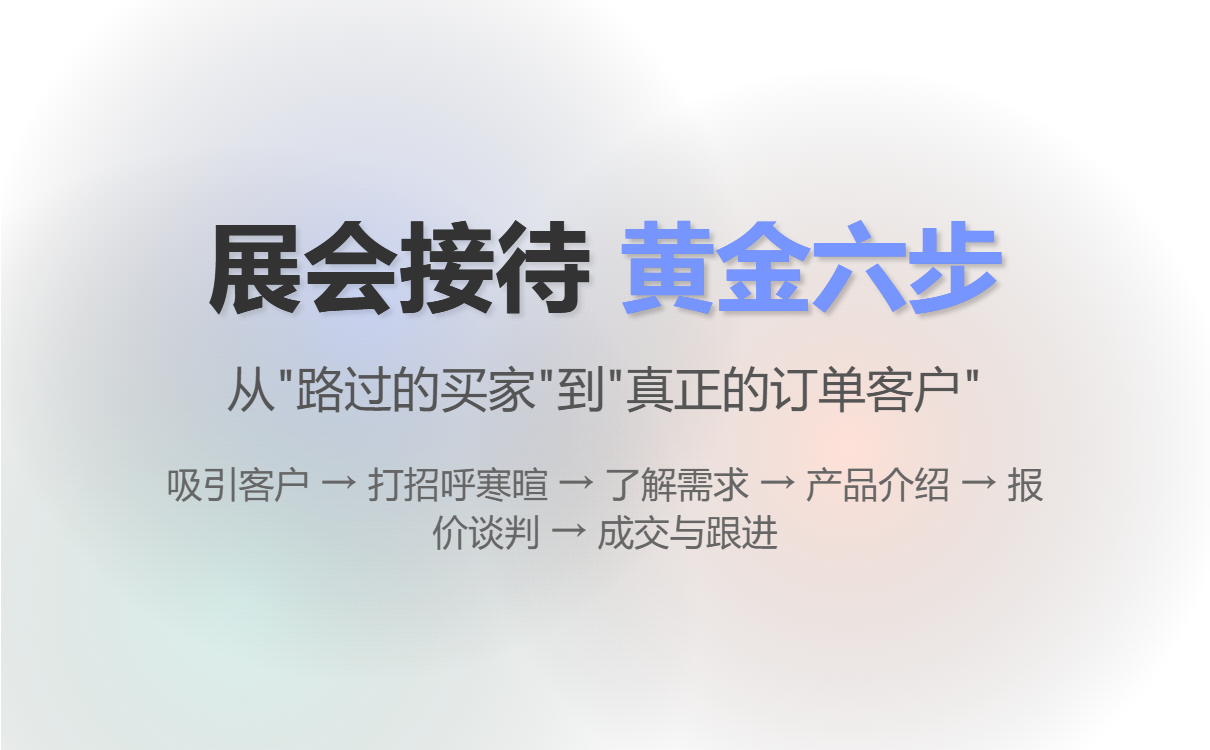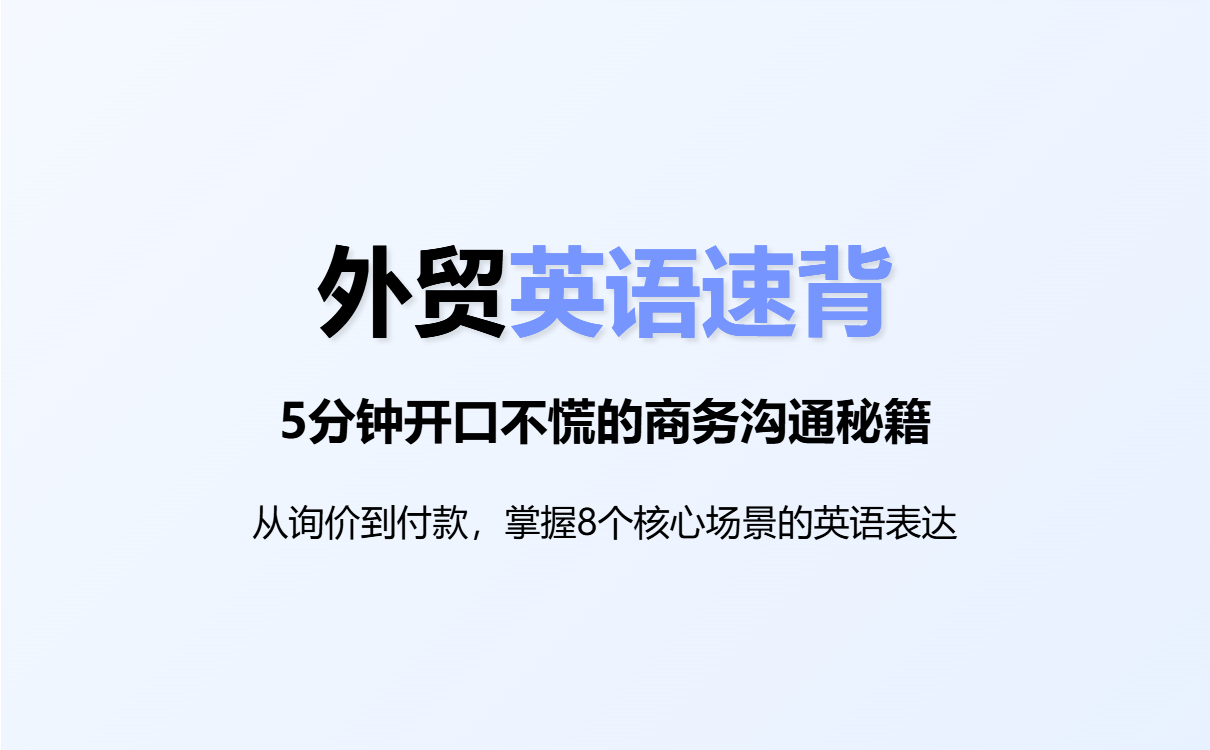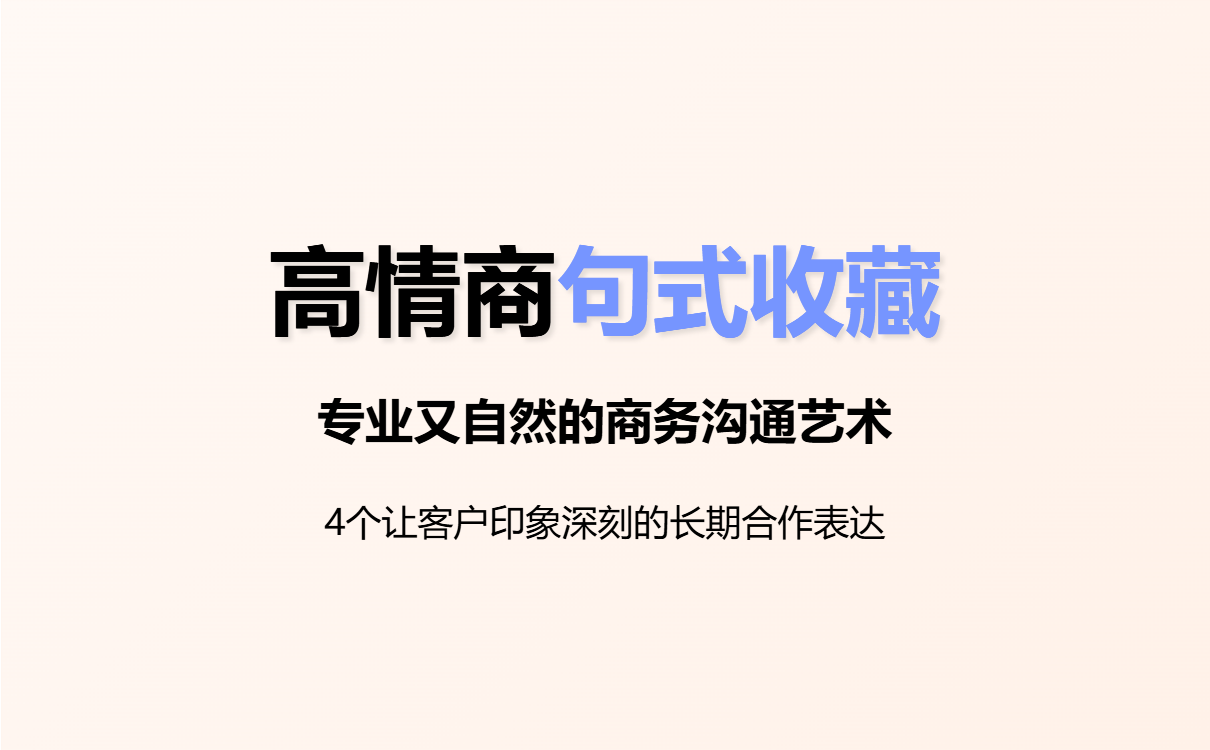 400-076-6558智领未来,外贸超级营销员
400-076-6558智领未来,外贸超级营销员
 400-076-6558智领未来,外贸超级营销员
400-076-6558智领未来,外贸超级营销员

The 138th Canton Fair (opening on October 15, 2025) , with over 32,000 exhibitors and buyers from more than 200 countries, is a true "barometer" of global trade.
For many newcomers in foreign trade, insufficient fluency in spoken English, lack of confidence in reception, and panic in front of customers are the biggest obstacles to losing orders on site.
This [Canton Fair Chinese and English Speaking Practical Manual] is designed for exhibitors.
👉The main line is the reception process at the exhibition site (attracting customers → reception and communication → product introduction → price negotiation → order placement → farewell follow-up)
👉 Each session is equipped with:
✅ Practical Chinese and English conversation skills
✅ Real-life scenario tips
✅ High emotional intelligence speaking skills of foreign trade veterans

Attract customers → Greet and greet → Understand their needs → Product introduction → Quote negotiation → Transaction and follow-up
Every step is related to whether you can transform from a "passing buyer" to a "real order customer".
Customers walked past the booth, interested in the products but not stopping yet.
Spoken English:
"Hello! Would you like to take a look at our new products?"
“Hi, are you looking for [product type]? We have some new designs here.”
“Good morning! This model is very popular in your market.”
"Hi there! May I introduce our best-seller to you?"
Chinese reference:
Hello! Would you like to see our new products?
Are you looking for this type of product? This product is a bestseller in your market.
Good morning, this model is very popular in the European market.
"Actively smiling + making eye contact + handing out samples" in front of the booth is the golden trifecta.
The words should be short, slow and with an upward tone to make the other person feel welcome.
"Welcome to our booth! I'm [Your Name] from [Company Name]. Nice to meet you!"
"Is this your first time at the Canton Fair?"
“Where are you from?” / “Which market are you selling to?”
"Can I have your business card?"
Chinese meaning:
Welcome to our booth! I'm [Name] from [Company]. Nice to meet you!
Is this your first time at the Canton Fair?
Which country are you from? Which market do you focus on?
Can we exchange business cards?
📌 Don't sell your product directly! Build relationships first. Asking about "market" is more natural than asking about "country."
📌 Business card handing: Hand over the business card with both hands, take a quick look, and give a compliment.
"Nice card! Your company name sounds familiar."
"What kind of products are you looking for?"
"What's your main market or customer group?"
“Do you usually import or are you a wholesaler?”
"What's your target price range?"
"How often do you import this product?"
Chinese meaning:
What kind of products are you mainly looking for?
What is your main market or customer group?
Are you an importer or wholesaler?
What's your target price?
How often do you shop?
🟢 Treat your customers as partners rather than buyers, and use "we" instead of "you":
"We could help you expand your range in this line."
“We can support you with flexible MOQ and fast delivery.”
"This is our new model for 2025. It's made of [material], with [key feature]."
"It's very popular in [market]. Many clients like its [advantage]."
“We can customize color/logo/package as per your request.”
“Here is the catalog — may I show you our best-selling series?”
Chinese meaning:
This is our new product for 2025, made of [material] and featuring [highlights].
It’s very popular in [market] and customers love its [advantages].
We can customize the color, logo and packaging according to your requirements.
Here is our catalogue, can I show you our best-selling series?
Use the other country as an example to enhance the sense of substitution:
“In Germany, this model is hot in supermarkets.”
Don't introduce it in a rapid-fire manner; let the customer's response determine the rhythm.
“The price is 10 USD per piece based on MOQ 500 pcs.”
“FOB Shenzhen, valid for 30 days.”
“If your quantity is larger, we can offer a better price.”
“Do you prefer FOB or CIF?”
“Our price includes packaging and inspection.”
Chinese meaning:
The price is $10 per piece, with a minimum order quantity of 500 pieces.
FOB Shenzhen, the quotation is valid for 30 days.
Larger quantities can be discounted.
Do you want a quote of FOB or CIF?
The price includes packaging and inspection costs.
Quote the “regular price” first and then observe the reaction.
Alternative tactics you can use when customers are trying to lower prices:
"I understand your concern. But considering the quality/material, this is our best offer."
Or flexible counterattack:
"Let's find a way to make it a win-win — maybe we can adjust quantity or shipment term."
“Would you like to place a trial order?”
“We can arrange samples within 3 days after the fair.”
“May I know your target quantity for the first order?”
“We usually require 30% deposit before production.”
"Can I send you our PI later today?"
Chinese meaning:
Do you want to try an order first?
We can send samples within 3 days after the exhibition.
What is your estimated first order quantity?
We usually require a 30% deposit before production.
Can I send you a pro forma invoice today?
📌 Prepare "Sample Confirmation Form + Quotation Form + Order Intention Form" in both Chinese and English.
📌 When the other party is interested, immediately record the key points (quantity, color, packaging requirements).
📌 One thing to say before leaving the booth:
"I'll follow up with an email tonight. Thank you for visiting!"
Q: Your price is higher than others.
“Yes, but our quality and service can help you save cost in the long run.”
Q: Can you guarantee delivery time?
"Absolutely. We always deliver on time — we can show you records of our last orders."
Q: I need it cheaper.
"Let's discuss a bigger quantity or a longer cooperation plan to reduce the cost."
Q: I'll think about it.
"Sure. Can I have your contact so I can send more details later?"
"Thank you for visiting our booth. It's a pleasure meeting you!"
"I'll send you the quotation and samples after the fair."
“Enjoy the Canton Fair, and hope to see you again soon!”
Chinese meaning:
Thank you for visiting our booth, it was a pleasure to meet you!
I will send you the quotation and samples after the exhibition.
Enjoy your exhibition and see you soon!
Email Subject: [Follow up after Canton Fair – [Product Name]]
The email content includes: group photo/sample picture + quotation form + thank you message
Add a soft push at the end of the email:
“Looking forward to your feedback so we can prepare your sample immediately.”

| Scenario | English short sentences | Chinese meaning |
|---|---|---|
| greet | Nice to meet you! | Nice to meet you! |
| Request a Quote | What's your target price? | What is your target price? |
| Product Introduction | This is our new model. | This is our new model. |
| Talking about MOQ | Our MOQ is 500 pcs. | The minimum order quantity is 500 pieces. |
| Talk about delivery time | Delivery time is 25 days. | Delivery time 25 days. |
| Talk about payment | 30% deposit, 70% before shipment. | 30% deposit, 70% before shipment. |
| Send samples | We'll send samples next week. | We'll send samples next week. |
| Express gratitude | Thank you for your time! | Thank you for your time! |

"We always focus on long-term cooperation, not just one deal."
We focus more on long-term cooperation rather than just a single order.
“We can be your reliable partner in China.”
We can be your reliable partner in China.
"We'd love to grow together with your business."
We hope to grow together with you.
“You have a good eye — this model is really our top seller.”
You have a good eye, this is really our best seller.
Foreign trade veterans often say:
“Customers may not remember every word you say in English, but they will definitely remember your attitude.”
As long as you can communicate with the simplest sentences, the most sincere expressions, and the most professional information,
Even if your English is not perfect, you can still win trust and get orders .
.png?x-oss-process=image/resize,h_100,m_lfit/format,webp)
.png?x-oss-process=image/resize,h_100,m_lfit/format,webp)

.png?x-oss-process=image/resize,h_100,m_lfit/format,webp)
.png?x-oss-process=image/resize,h_100,m_lfit/format,webp)
.png?x-oss-process=image/resize,h_100,m_lfit/format,webp)
.png?x-oss-process=image/resize,h_100,m_lfit/format,webp)
